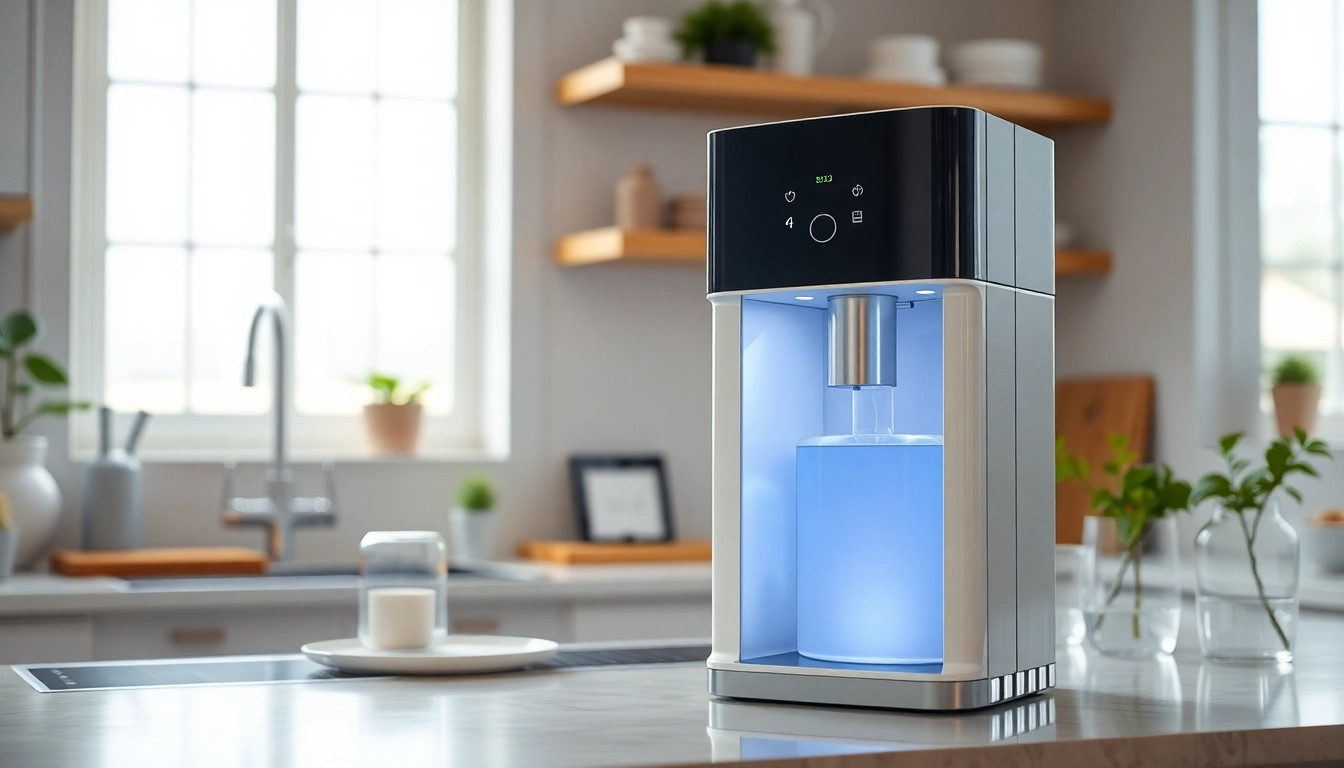Understanding the Home Water Purification System
What is a Home Water Purification System?
A home water purification system is essential for ensuring that the water available in your household is clean, safe, and free of harmful contaminants. These systems work by filtering out impurities, including bacteria, viruses, heavy metals, chemicals, and sediment that may be present in tap water. Designed for easy installation and use, these systems cater to a variety of needs, from basic filtration to advanced purification methods that enhance overall water quality. Incorporating a home water purification system can lead to significant health benefits, and peace of mind when it comes to daily consumption and usage.
The Benefits of Home Water Purification Systems
Investing in a home water purification system offers numerous advantages:
- Improved Health: By eliminating contaminants, a purification system helps reduce the risk of waterborne diseases and health issues linked to chemical exposure, such as gastrointestinal disorders and developmental defects.
- Enhanced Taste and Odor: Purified water tastes better, as it eliminates unpleasant flavors and smells. This improvement increases the quality of cooking, drinking, and making beverages.
- Cost-Effectiveness: Although the initial investment may seem significant, having a purification system can reduce your reliance on bottled water, leading to substantial savings over time.
- Environmental Benefits: Using a water purification system reduces single-use plastic waste from bottled water, making it an eco-friendlier option.
- Convenience: Home systems provide a constant supply of clean water that can be accessed at any time, making it a hassle-free solution compared to purchasing water from the store.
Different Types of Home Water Purification Systems
There are several types of home water purification systems designed to tackle specific needs:
- Activated Carbon Filters: These filters use activated carbon to absorb impurities and chemicals, effectively removing chlorine and organic compounds.
- Reverse Osmosis Systems: Utilizing a semi-permeable membrane, reverse osmosis systems effectively remove larger contaminants and ensure higher purity levels.
- Ultraviolet (UV) Light Purifiers: UV purifiers use ultraviolet light to kill bacteria and viruses, ensuring waterborne pathogens are effectively neutralized.
- Distillation Systems: By heating water to create steam and then condensing it back into liquid, distillation systems can remove a wide range of impurities, including salts and heavy metals.
- Whole House Filtration Systems: These systems treat all water entering your home, ensuring that water used for showering, cooking, and cleaning is purified.
How to Choose the Right Home Water Purification System
Assessing Your Water Quality Needs
The right home water purification system begins with understanding your water quality needs. You may consider performing a water test to identify potential contaminants in your supply. Many local health departments offer testing services, or you can purchase at-home testing kits. Based on the results, assess which contaminants you need to prioritize in filtration, whether they’re chemicals, bacteria, or heavy metals.
Factors to Consider When Selecting a System
When choosing a water purification system, consider the following factors:
- Contaminant Removal: Verify that the system can remove or reduce the specific contaminants found in your water.
- Flow Rate: Assess the system’s flow rate to ensure it meets your household’s water needs, especially during peak usage hours.
- Maintenance Requirements: Consider how often filters need changing and the associated costs and complexity of maintenance.
- Space and Installation: Evaluate where the system will be placed and whether it requires complex installation or can be a DIY project.
- Cost: Examine the overall cost, including the initial setup and long-term servicing expenses to find a balance that fits your budget.
Comparing Different Home Water Purification Systems
To make an informed decision, compare several systems based on the aforementioned factors. Create a table or spreadsheet to list their features, capabilities, initial costs, and maintenance requirements. This visual representation can streamline your decision-making process, making it easier to weigh the pros and cons of each system.
Installation and Maintenance of Home Water Purification Systems
DIY Installation vs. Professional Installation
Installation options vary between DIY and professional services. For DIY installation, it’s crucial to follow manufacturer guidelines carefully to ensure proper setup. Many systems are designed for straightforward installation, requiring just basic plumbing skills. However, complicated systems, like whole-house filtration units or reverse osmosis systems, may benefit from professional installation due to the complexity involved. Hiring a professional ensures the system is set up correctly and can potentially void warranties if improperly installed.
Regular Maintenance Tips for Your System
Regular maintenance is vital to keep a home water purification system functioning effectively. Follow these maintenance tips:
- Change Filters Regularly: Adhere to the manufacturer’s schedule for filter changes. Neglecting this may lead to decreased effectiveness and water quality.
- Sanitize Your System: Periodically clean and sanitize your system to prevent the buildup of bacteria and biofilm.
- Check for Leaks: Regularly inspect your system for leaks or unusual sounds, as these can indicate maintenance issues that need to be addressed.
- Monitor Water Quality: Continue to test your water periodically to ensure that the system remains effective in removing contaminants.
Common Issues and Solutions
As with any system, home water purification systems may face several common issues:
- Reduced Water Pressure: This can indicate clogged filters that require replacement. Ensure you regularly monitor and change your filters as recommended.
- Unpleasant Taste or Odor: If water quality decreases, check filters and the overall system for maintenance needs. Bacterial growth or build-up in the tank may require cleaning.
- Frequent System Shutdowns: Systems may shut down due to contamination or malfunction. Consult the manufacturer’s manual for troubleshooting steps or seek professional assistance.
Cost Considerations for Home Water Purification Systems
Initial Costs and Installation Expenses
The initial cost of a home water purification system may vary widely based on the type of system selected and its complexity. Basic activated carbon filters can start at a nominal price, while comprehensive systems such as reverse osmosis or whole-house units may cost more significantly. Additionally, professional installation can incur fees ranging from moderate to high, depending on the intricacy of the system.
Long-term Savings and Value Assessment
Investing in a home water purification system can lead to considerable long-term savings. By reducing or eliminating the need for bottled water, families can save hundreds of dollars annually. Moreover, clean water can contribute to better health, potentially lowering medical expenses linked to waterborne illnesses.
Financing Options for Home Water Purification Systems
Budget-conscious consumers may explore various financing options for their home water purification systems. Many vendors offer payment plans, or you might consider using a home improvement loan. Some local and state governments also provide funding or rebates to encourage water systems that promote safe drinking water, improving affordability.
Enhancing Your Home Water Purification System Experience
Creating a Family-Friendly Water Filtering Routine
To ensure proper usage of your home water purification system, establish a family-friendly water filtering routine. Encourage every household member to drink purified water throughout the day, perhaps by placing a designated pitcher in the refrigerator. Engage your family in learning to refill water bottles from the purification system, promoting sustainability and an understanding of the benefits of clean water.
Supplemental Products for Enhanced Water Quality
For families seeking to improve water quality further, supplemental products can add value. Consider adding water pH testers, remineralization filters, or even dedicated dispensers for ease of access. This not only enhances the water quality but also creates a culture of health and wellness at home.
Educating Your Family on Water Purification Benefits
It is essential to educate your household about the importance of water purification. Discuss the various contaminants that can affect water quality, their potential health impacts, and the advantages provided by your purification system. This knowledge fosters a sense of responsibility and can motivate family members to prioritize clean drinking water in their lifestyles.


